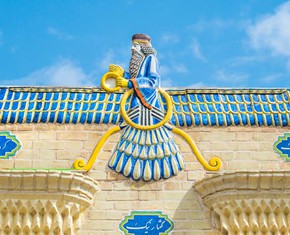The views expressed in our content reflect individual perspectives and do not represent the authoritative views of the Baha'i Faith.
“She wasn’t really a Christian.” That was the punchline of an encounter my college-aged daughter had with a Christian friend, Eli, who had engaged her and several other Baha’i students in conversation.
The “she” in question was me.
The assessment came about through Eli’s curiosity about how my daughter came to be a Baha’i. She explained that she had been born into a Baha’i family but that her mother had come into the Faith from a Christian background.
RELATED: Did Baha’u’llah Fulfill the Prophecies of Jesus?
Eli asked, “What denomination?”
The answer to that was “many” because of how my mother felt about hearing messages from the pulpit unsupported by the Biblical text. When I was a child, our family attended Baptist, Catholic, Presbyterian, Methodist, Episcopalian, Congregationalist, and non-denominational churches.
Eli then asked, “Did her churches teach that Jesus is God?”
My daughter told him that she thought my churches taught that Christ Jesus was the Son of God, which sparked Eli’s open-and-shut response that I had not really been a Christian.
Some of you may be thinking that it should be an open-and-shut response. Either Jesus is God, or he is not God, and you might think that believing one or the other is the criteria for salvation. But the reality is that this binary certitude only exists in the chasm between God’s infinite spiritual reality and our ability to comprehend it from our very finite, physical — dare I say, materialistic — point of view.
The answer I’d give Eli if he asked me directly is this: Insofar as we can comprehend God, Christ Jesus is God. Insofar as God is sanctified from human limitation, Jesus is not God … but he perfectly reflects God’s Divine reality because his own Spirit — the Spirit who speaks in the Book of Revelation — is begotten of God.
Let’s go to the Bible to test this, beginning with the sort of Being Christ tells us God is in the Gospel of John: “God is spirit, and his worshipers must worship in spirit and in truth.”
The Bible also states in Hebrews 1 that although he appears as a human being, Christ Jesus is the son and “express image” of this Spirit:
God, who at various times and in various ways spoke in time past to the fathers by the prophets, has in these last days spoken to us by His Son … through whom also He made the worlds; who being the brightness of His glory and the express image of His person … sat down at the right hand of the Majesty on high …
The Revised Standard translation of the Bible says Christ “bears the very stamp of [God’s] nature;” the International Standard Version says he is “the reflection of God’s glory;” the Holman translation gives us “the exact expression of His nature.” None of these descriptions even imply that God, the ultimate spiritual reality, left the spiritual realm and literally descended into a human body or that the Infinite became finite. In fact, all of them keep God in “heaven” by describing Christ as a stamp, an imprint, an expression, a reflection of the Spirit of God in human form.
When confronted with the Baha’i Faith at the age of 19, I naturally retreated to my own Christian scriptures to grapple with its implications. I was struck by the way Baha’u’llah explained what the author of the Book of Hebrews struggled to capture — the divine yet human nature of Christ. Here is one of those passages, from Baha’u’llah’s Book of Certitude:
The door of the knowledge of the Ancient of Days being thus closed in the face of all beings, the Source of infinite grace … hath caused those luminous Gems of Holiness to appear out of the realm of the spirit, in the noble form of the human temple, and be made manifest unto all men, that they may impart unto the world the mysteries of the unchangeable Being … These sanctified Mirrors, these Day Springs of ancient glory, are, one and all, the Exponents on earth of Him Who is the central Orb of the universe, its Essence and ultimate Purpose. From Him proceed their knowledge and power; from Him is derived their sovereignty. The beauty of their countenance is but a reflection of His image, and their revelation a sign of His deathless glory. … These Tabernacles of Holiness, these Primal Mirrors which reflect the light of unfading glory, are but expressions of Him Who is the Invisible of the Invisibles. By the revelation of these Gems of Divine virtue all the names and attributes of God, such as knowledge and power, sovereignty and dominion, mercy and wisdom, glory, bounty, and grace, are made manifest.
Here, Baha’u’llah paints a portrait of the ones God sends to guide us as perfect mirrors pointed directly at the Primal Light, reflecting God’s spiritual reality in such a way that we may recognize it and turn the mirrors of our own hearts toward it. The agency by which that Most Great Light reflects in the flesh and blood mirror is the Holy Spirit.
With this portrait, Baha’u’llah affirms the words Christ and his disciples used to explain the marriage of divinity and humanity he represented. In the Garden of Gethsemane, Christ prayed to his divine Father with these words: “I have manifested Your name to the men whom You have given Me out of the world. They were Yours, You gave them to Me, and they have kept Your word.”
In II Corinthians, the Apostle Paul also wrote of this relationship between God and Christ:
Now the Lord is the Spirit; and where the Spirit of the Lord is, there is liberty. But we all, with unveiled face, beholding as in a mirror the glory of the Lord, are being transformed into the same image from glory to glory, just as by the Spirit of the Lord.
Paul’s message is clear: by beholding the glory of God in the mirror of Christ Jesus, the believers are themselves transformed into reflectors (albeit imperfect ones) of Christ’s divine qualities. This is the same analogy Baha’u’llah offers to the “mystery” of divine manifestation: The human mirror reflects the glory of the Spirit that is God.
We now come to a crucial difference in the way that Eli and I understand Christ’s relationship with God. Eli believes, as I once did, that the Spirit of Christ was manifest just once in all of humankind’s tortured history. It was manifest solely in a tiny region caught fast in the talons of the Roman Empire. It was manifest for a brief three years out of millions. Only a handful of individuals were graced with its presence. Those who inhabited other parts of the world — India, the Americas, Europe, and Asia — lived and died in the darkness beyond the reach of Christ’s light.
RELATED: What My “Yes” to Baha’u’llah Means for My “Yes” to Jesus
More than that, lacking any manifestation of the Being Baha’u’llah calls “the Central Orb of the Universe,” and whom Christ Jesus portrays as the loving, omnipotent Father of all, they were left to invent their own gods, something for which I was taught, their souls were consigned to hell. This, despite the fact that their Great Spirit or Spirit Supreme or Ahura Mazda or the Absolute or Aten-Amen-Ra or Allah bore a striking resemblance to the God Who, for whatever reason, neither guided them nor manifested Himself to them.
This was my great, unanswered question, which I carried with me from church to church. It pitted the God Christ reveals in Matthew 7 against the God of the pulpit, and it disturbed me, haunted me: How could the God that Christ revealed do what a succession of pastors claimed He had done – deprived billions of His human children of the bounty of His word, His guidance and His love because they were born in the wrong place at the wrong time?
I think that question deserves an answer.
















Comments
Sign in or create an account
Continue with Googleor